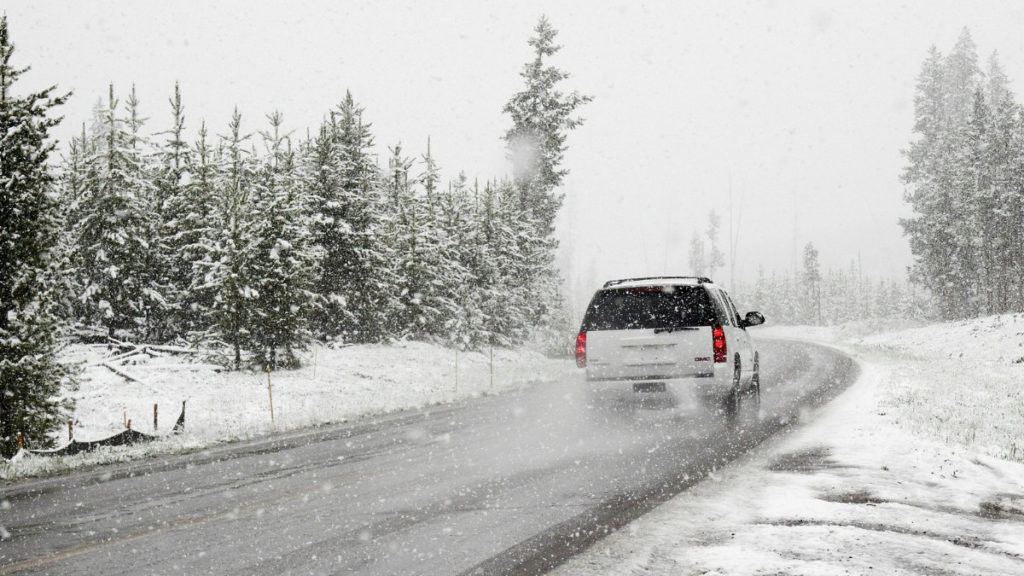Last Updated on December 3, 2025 by Elizabeth

Planning on a ski trip to the Rockies this winter? Colorado’s traction law requires vehicles to be equipped for the worst mountainous road conditions. But most car rental companies can’t guarantee in advance that customers will receive a vehicle with four- or all-wheel drive. This may put some renters between a rock and a hard place.
Ask AutoSlash for a Quote on a Cheap Car Rental
What Does Colorado’s Traction Law Say?
Colorado lawmakers recently updated the requirements for passenger vehicles using state highways during winter months. Now every vehicle traveling on state highways must have adequate tire tread and traction-control devices during snow events.
During the winter season, the new traction law (a.k.a. Code 15) requires motorists to have 4WD/AWD vehicles. Alternatively, drivers must have either snow tires or tires with the mud/snow (M+S) designation when driving on certain highways. When in effect, the law sets the required minimum tire tread at 3/16 inch on both snowy and dry roads.
Which Parts of Colorado are Most Affected?
One route impacted by this law is Interstate 70. This route cuts through Summit County between the Eisenhower Tunnel and Vail Pass. Motorists caught driving inadequate vehicles could be fined a minimum of $130. Worse yet, if the vehicle is blocking the road, the fine jumps to $650.
How to Make Sure Your Rental Car is Compliant
It’s difficult to reserve a compliant vehicle through a rental car company in advance. If you peruse the website of your favorite brand, there is typically not a search option for 4WD vehicles.
Many SUVs and pickup trucks (typically the larger vehicle classes) come with AWD or 4WD, and you’re covered if your vehicle has it. But when we called the rental car agencies at Denver International Airport, none could guarantee the availability of a vehicle with four- or all-wheel drive.
Let AutoSlash Track Your Car Rental for Price Drops
In that situation, installing chains would bring you in compliance with the law, but rental car companies generally discourage them. The rule stems from fear that chains can damage the vehicles. Also, rental car companies know that many people don’t know how to properly install tire chains.
However, there is a notable exception. Rental car companies will allow snow chains or traction devices during Code 15 and Code 16 advisories. Code 15 requires motorists to have either a 4WD vehicle or snow tires or tires with the mud/snow (M/S) designation. Also, tires must have a minimum one-eighth-inch tread. Code 16 requires every vehicle on the roadway to have chains or an alternative traction device.
In the fine print, you will find language about the use of chains being prohibited “except where required by law.” Still, if you are contemplating using chains on your rental car, you should definitely look over your rental agreement and make sure that disclaimer is included.
At AutoSlash, we can help you search for SUVs and trucks in areas with winter weather—but be prepared to pay more. During snow storms and high-demand holidays, we will often see these vehicles renting for more than $300 per day.
Concerned about securing an AWD or 4WD vehicle? Follow our tips below to maximize your chances of getting one.
How AutoSlash Can Help You Land a 4WD or AWD Rental Car
When you request a quote from AutoSlash, you’ll be asked what kind of vehicle you would like. If a 4WD/AWD vehicle is available, you’ll see the option to request it in the Drive Type Preference section at the bottom of the vehicle selection page. Note that you’ll only see the option to choose AWD/4WD for certain vehicle types — typically SUVs, Jeeps, and pickup trucks. This feature is available for all locations, but it’s most helpful if you’re renting in Colorado during the winter, given the state’s new traction law.
Boost Your Chances for Snagging a 4WD or AWD Vehicle
- The larger SUV classes are more likely to have 4WD/AWD. We typically recommend booking at least a standard SUV as many compact and intermediate SUVs are 2WD.
- If there is a choice, renting from an airport location is always better. Airport locations usually have larger selections of vehicles.
- Renting from a top-tier brand increases the likelihood that you can get a 4WD/AWD model. They tend to have better selections and can sometimes pull vehicles from sister companies if needed.
- Signing up for the rental company’s loyalty program is worthwhile. It may give you a bit more clout in terms of vehicle selection.
- Rent a Jeep. Most major rental car companies offer them. Although they typically say “Jeep Wrangler or similar,” reserving this class will guarantee you a 4WD drive vehicle. The main question is whether you will get a two-door or four-door model. Some companies have different classes for each type while others — Hertz, for example — offer only one type. It depends on what is available at the time you pick up your rental.
Related:



